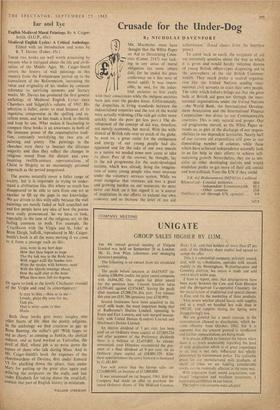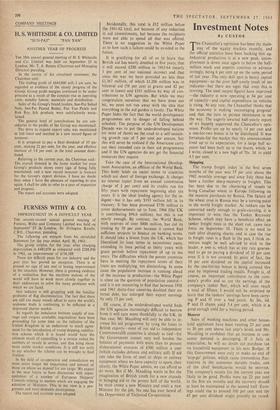Crusade for the Under-Dog
By NICHOLAS DAVENPORT
MK. M AUDLING must have thought that the White Paper on Aid to Developing Corm- -, tries (Cmnd. 2147) was lack- ' ing in any sense of moral
obligation (as some others did), for he ended his press conference on a line note of moral uplift. It was impos- sible, he said, for the indus- trial societies to live easily with their consciences while the indigent societies were just over the garden fence. Unfortunately, the disparities in living standards between the industrialised countries and the rest of the world were actually widening. (The rich get richer more quickly, than the poor get less poor.) The de- velopment of the concept of aid was, therefore, not merely economic, but moral. With the with- drawal of British rule over so much of the globe, he went on, a great outlet for the enthusiasm and energy of our young people had dis- appeared and for the sake of our own morale as a nation we needed sonic new cause to take its place. Part of the answer, he thought, lay in the aid programme for the .underdeveloped nations, which was already tiring the imagina- tion of many .young people who went overseas under the voluntary services system. While we must recognise that overseas aid was a great and growing burden on our resources, we must never cut back on it but regard it as 'a source of inspiration in our efforts to expand our own economy and so increase the level of our aid achieNement,' (Loud cheers from the heartless press.) To come back to earth, the recipients of aid are extremely sensitive about the way in which it is given and would hardly welcome dozens of young British officer-types dispensing aid in the atmosphere of the old British Common- wealth, They much prefer a neutral organisa- tion like the United Nations sending 'inter- national civil servants to train their own people. The table which follows brings out that the great bulk of British aid goes not through the inter- national organisations under the United Nations -the World Bank, the International Develop- ment Association and the International Finance Corporation—but direct to our Commonwealth countries. This is only natural and proper. Our aid programme started, as the White Paper re- minds us. as part of the discharge of our respon- sibilities to our dependent territories. Nearly half of our current aid expenditure still goes to our diminishing number of colonies, while those which have achieved independence naturally look to us for help in their efforts to achieve self- sustaining growth. Nevertheless, they arc as sell sitive as other developing nations and would doubtless prefer to get more of their aid, untied and non-political, from the UN if they could.
.1 id Disbursements 1962-63 (in million) Bilateral aid Colonial territories .. ..
60.6
- -Independent Commonwealth
62.3 –Other countries .. .. 15.0
Multilateral aid (through UN agencies) .. 9.9
147.8
Incidentally, this total is £12 million below the 1961-62 total, not because of any reduction in aid commitments, but because the recipients were not able to spend all that was offered. There is no suggestion in the White Paper as to how suck a failure could be avoided in the future.
It is gratifying for all of us to learn that British aid has nearly doubled in five years, that it will exceed £200 million in 1963-64 (nearly 1 per cent of our national income) and that since the war we have provided no less than £1,367 million, of which £1,206 million was in bilateral aid (58 per cent in grants and 42 per cent in loans) and £161 million by way of con- tributions to UN agencies. But while we may congratulate ourselves that we have done our bit, we must not run away with the idea that everything in the aid garden is lovely. The White Paper hides the fact that the world development programmes are in danger of falling behind schedule. The purpose of the UN Development Decade was to put the underdeveloped nations (or most of them) on the road to a self-sustain- ing growth rate of 5 per cent per annum, but this will never be realised if the Americans carry out their intended cuts in their aid programmes and if the UN agencies do not get the financial resources they require.
Take the case of the International Develop- ment Association, an affiliate of the World Bank. This body lends on easier terms to countries which are short of foreign exchange. It charges no interest (apart from an annual commission charge of I per cent) and its credits run for fifty years with repayment beginning after ten years. It is the ideal lending agency for the in- digent—but it has only $193 million left in its treasury. It has been promised $750 million to cover disbursements up to June, 1966 (the UK is contributing $96.6 million), but this is not nearly enough. By contrast, the World Bank, with reserves of over $800 million, has cut its lending by 50 per cent because it cannot find sufficient projects to finance on banking terms. It should take a lesson from the UK, which has liberalised its loan terms in necessitous cases, extending its loan period to thirty years with grace periods before repayment of up to ten years. The difficulties which the poorer countries have in meeting the repayment terms of their loans are multiplying, not diminishing. In some cases the population increase is running ahead of the increase in production—the White Paper is silent on the question of population control— and it is not reassuring to find that between 1956 and 1961 thirty-four countries doubled their ex- ternal debt, but enlarged their export earnings by only 15 per cent.
Of course, if the underdeveloped world finds the UN agencies increasingly difficult to borrow from it will turn more thankfully to the UK. In that case, Mr. Maudling will only be able to in- crease his aid programme by tying the loans to British exports—most of our aid to independent Commonwealth countries is already so tied—for the Government cannot very well burden the balance of payments with more than its present disbursement overseas of £500 million a year (which includes defence and military aid). If aid can take the form of steel or ships or railway equipment where we have capacity to spare, then clearly, the White Paper admits, we can afford to do more. But if Mr. Maudling wants to fire the imagination of British youth for a new crusade in bringing aid to the poorer half of the World, he must create a new Ministry and exalt a new Minister for the job. No one has ever heard of the Department of Technical Co-operation.



































 Previous page
Previous page